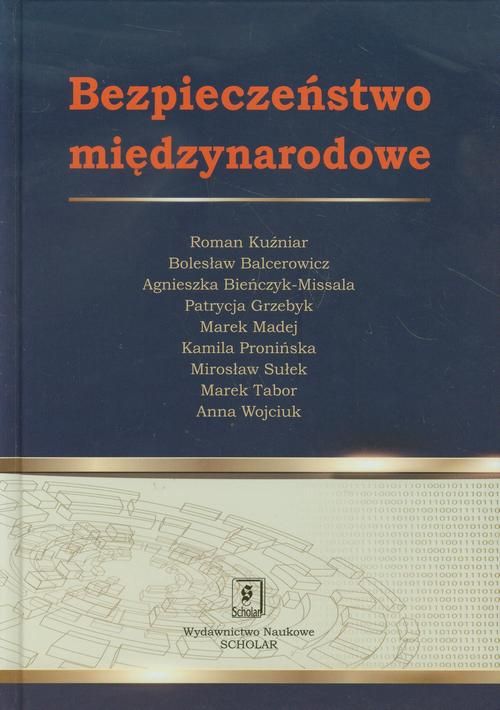
We kindly inform you that, as long as the subject affiliation of our 300.000+ articles is in progress, you might get unsufficient or no results on your third level or second level search. In this case, please broaden your search criteria.




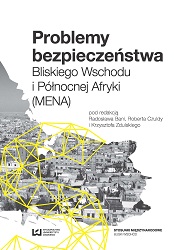





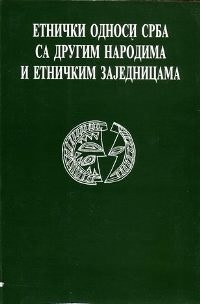
In contemporary conditions of ethnic and national revival, the Serbs are referred to review their relations with other people. We should accede to these tasks reliably and truthfully, bearing in mind scientific ethos and maturity of the people we belong to. Serbian great migrations should make us be always aware of possibilities of making big synthesis: between our own culture and civilisations of the countries we live in. All the nations of the world are unequally overtaken by processes of speeding up uniqueness and searching, i.e. globalisation and mondialisation of the culture. Different nations accepted these processes in different ways. For example national minorities and some parts of the same nation did not react equally on the very same impetus. If we accept the fact that the main characteristics of the ethnic entity is direction towards past, and that that past is not only the concern of the historical science, but everything realised by collective memory, we shall for example reveal ethnic tolerance in the Middle aged Serbia, live dialogue with other nations. We shall also reveal irrational "Serbophobia" in Austria at the beginning of the 19th century. We cannot deny the fact that the main difficulties in the process of national integrity of the Serbs really happened. They are happening, too, because of powerful Serbian national identity developed under the influence of different cultural and religious surroundings. Serbian people, with highly developed national consciousness, particularly their edged part, did not - according to Western opinions - expose certain amount of exact "co-operation". Imposing parting with epic, "mythological" past is in severe conflict with collective memory of Serbian people, primarily in the Western parts of the ethnic area. Considering ethnic / national relations of the Serbs and other people, we shall not neglect different historical and social context in which these processes developed and are developing. It is shown how possible it is without any time distance to change character of those relations in recent couple of years. Ethnic conflict in Bosnia and Hercegovina, as an aspect of social conflict, has its social and cultural foundation. Confessional background (ethnic conflicts, concerning religious and cultural cohesion, are often religious wars) is very similar to conflicts in border area and it is powerfully coloured with different "historical memory". Two sides ethnic conflict inside Bosnia is followed by inter ethnic conflicts (Muslim: Muslims, Serbs: Serbs). Bosnian conflict must unavoidably be considered within Yugoslavia in general, in context of continuous clashes and new ethnic sharing in Europe and elsewhere. The last war in Bosnia, as it is known, ended by signing defrauded peace agreement. As it always happens, in any war, peace talks were preceded by the defeat of the sides in war, claiming its ethnic space and disarming. The other side also feels defeated, because initial and rising ambitions have not been fulfilled. Some 60% of the today's Union of Bosnia and Hercegovina are pronounced refugees. They all agree that there was "foreign hand" in legal state in former Yugoslav republic. Peace agreement was signed, but real peace, as it is shown, is still far away. Own collective memory is formed and it is developing in every entity. And it is known that each nation in Bosnia and Hercegovina had, from different periods of time, examples of "own" historical memory concerning others, mostly with negative connotation. Only were someone else's crimes remembered and retold. In the period of "opening" at the end of the eighties, patriotism was shown on different sides. Soon after, it was transformed into a sort of emotive nationalism. Our researchers added the adjective "resantimanski" to this kind of Serbian nationalism. It was not the same type of nationalism, as the others in our area. The worst of all is the fact that national matter was placed in former context, connected with the wars for territory (moving of borders) and tending towards ethnic homogenisation (moving of people). Theoretically speaking, secessionism could only be the consequence of regardless manipulation of masses. The occurrences in Yugoslavia and Bosnia had been smouldering for centuries. Although, ethnic clashes were not the product of inherent intolerance, there was much "silence fulfilled with contents" in our case. Model of secessionism is almost the very same in highly developed countries of the unique Europe and it has many elements. In separate tendencies, majority is sometimes activated, and sometimes only one or two elements are put into the first plan. Mostly rich North refuses to invest in development of the poor South, but there are variations (Cypress, Azunija). There are also no investments in the army proportionally to income. Not only people do abandon the mutual state, but also small ethnic communities taken by this. In this way "atomisation" spreads over ethnic groups. In the end some post conflict difficulties in functioning new state organisms in Bosnia are shown. There are examples of Muslim - Croatian misunderstanding in mutual federal state, and deliberate avoiding of mentioning Serbs, as if they did not live there.
More...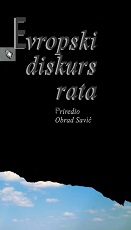
Prva zamisao ovog filozofskog zbornika o ratu njegovom diskursu nastala je početkom devedesetih godina. Ta zamisao nije bila lišena, tako da kažem, mirovnjačke diplomatije. U pozadini ubrzanih i veoma dramatičnih dogadaja u Jugoslaviji, postepeno koncepcijsko uobličenje zbornika poprimilo je didaktičke tonove. Ono što je ovaj zbornik nastojao da rekonstruiše u području teksta, ponovo je, u svoj žestini, progovorilo kontekstualno. U ranim devedesetim, javni diskurs su nasilno kolonizovali upravo oni elementi govora rata za koje sam verovao da su odavno otpisani i nepovratno arhivirani. Neprosvećene i sasvim primitivne forme militarističkog diskursa nezadrživo su provalile u svakodnevni život. Uprkos neobično čestom iskustvu rata, s kojim smo se ovde i sada ponovo susreli, iznenadio me je nizak teorijski nivo ratničkog diskursa. Pod naletom gole sile, procedura racionalnog argumentisanja sasvim je izostala: atavizam ratnih sredstava ponovo je preuzeo mandat kultivisanim inicijativama.
More...
The initial idea of this philosophical anthology on war and its discourse was formed at the beginning of the Nineties. This idea was not deprived of, so to say, pacifist diplomacy. In the background of accelerated and very dramatic events in Yugoslavia, gradual conceptual shaping of the anthology took on didactic overtones. That which this anthology attempted to reconstruct in the area of text started speaking again, with all vehemence, contextually. In the early nineties public discourse was forcefully colonized by precisely those elements of war talk which I believed had been long ago written off and irretrievably archived. Uneducated and totally primitive forms of militaristic discourse irrepressibly burst through into everyday life. In spite of exceptionally frequent war experience with which we have met here, and were now meting once again, I was surprised by the low theoretical level of war discourse. Under the surge of naked force, the procedure of rational argumentation was completely absent: atavism of war means once again overtook the mandate of cultivated initiatives.
More...
Kada sam pošao u rat radovao sam se, verovatno kao i svaki mladi čovek tih dana, onome što je nejasno stajalo pred nama. Slutili smo da će se taj doživljaj duboko i snažno odraziti na naš razvoj i u njemu smo videli kratku, veliku školu iz koje ćemo se vratiti ili kao ljudi, ili se uopšte nećemo vratiti. Mi smo naraštaj kome smo pripadali smatrali starim, i činilo nam se kao čudesan san da možemo sa oružjem u ruci, sa svim što smo mi doprineli, da ratujemo za slavu zemlje. Osećali smo da smo dorasli odgovornosti koja se iznenada svalila na nas, da je istorija u nama oživela i učinila nas delom plodne i jedinstvene snage. Reč otadžbina promenila nas je iz osnova i kao nekakva čarobna formula ona je bila rešenje nesloga i razdora koje je svakog zadovoljavalo. Za oružje sposobna omladina našla se u punom broju u pukovima; ona je delom pokazala da je dorasla zadatku koji je vreme pred nju postavilo i da zemlja na nju može da se osloni.
More...
Platon u Državi govori o ratu kao o »temeljnoj veštini«, što znači da je rat posebna forma rada, moguća samo u okvirima organizovane »podele rada«, koja, opet, predstavlja vrhovnu veštinu pólisa. Rat je, dakle, »demijurg«. Upravo delo demijurga dovodi do krajnje granice destruktivno obeležje demijurškog - kao što kasnije kapitalizam do krajnje granice dovodi obeležje konstruktivnosti.
More...
Kao saučesnik mitova, neka uzavrela snaga periodično iz osnova pokreće primitivna društva: ta snaga je praznik. To je pojava čije trajanje, snaga i širina samo iz daleka liče na dane sračunatih prolaznih zadovoljstava koje poznaju složenije civilizacije. Neopravdano pomislimo na odmor koji nam se nbrzo otkriva, ne kao ekvivalent, već kao suprotnost antičkih svetkovina.
More...
Dok sam poslednjih nekoliko godina istraživala, pokušavajući da spojim delove onog što bi se moglo nazvati »fragmenti ratničkog diskursa« u Zapadnoj kulturi, slučajno sam naišla na sledeću gnostičku zagonetku: »Dokle će muškarci ratovati? - Sve dok žene imaju decu«. Na prvi pogled odgovor podseća na parafraze onih uobičajenih zagonetki iz detinjstva koje bi se mogle nazvati »Zauvek«, (npr. »Dok okean ne presuši«), ili na •Šekspirovog Magbeta (»Dok Birnamska šuma ne počne da se kreće/ Na njega i ne dođe na brdo Dansinejsko«). Međutim, pri bližem ispitivanju - ili bolje reći, posle daljeg čitanja tokom kojeg sam bezbroj puta naišla na analogiju između ratovanja i rađanja dece - učinilo mi se da ova stara zagonetka zahteva uzročno-posledičnu interpretaciju: »Ako bi žene samo prestale da rađaju, muškarci bi prestali da ratuju«. Ovo bi, naravno, moglo da bude truizam, jer ako žene prestanu da rađaju očigledno ne bi bilo muškaraca koji bi mogli da ratuju. U obrnutom smeru, ova bi tvrdnja mogla da podrazumeva - i to je implikacija koja se istražuje u ovom tekstu - da muškarci ratuju zato što žene rađaju. Prvo ću pomenuti nekoliko mitskih i istorijskih arhetipova koji uključuju teme herojstva i neporočnosti, hrabrosti i čednosti, a potom ću analizirati upadljivu ekvivalentnost izmedu materinstva i ratovanja.
More...
Sukcesivno, nailazimo na tri problema: da li je bitka »predmet« rata? I još: da li je rat »predmet« ratnog stroja? Najzad, u kojoj je meri ratni stroj »predmet« aparata Države? Dvosmislenost prva dva problema zacelo proizlazi iz termina predmet, ali uključuje i njihovu zavisnost od trećeg termina. Zbog toga se i moraju razmatrati jedan za drugim, makar time bili navedeni da umnožavamo slučajeve. Prvo pitanje, pitanje bitke, stvarno zahvata neposredno razlikovanje dva slučaja: prvog, gde se bitka traži, i drugog, gde je ratni stroj suštinski izbegava. Ta dva slučaja uopšte se ne poklapaju sa ofanzivom i defanzivom. Međutim, izgleda da je predmet rata u pravom smislu te reči (prema jednoj zamisli čiji vrhunac nalazimo kod Foha) bitka, dok gerila za sebe izričito pretpostavlja ne-bitku.
More...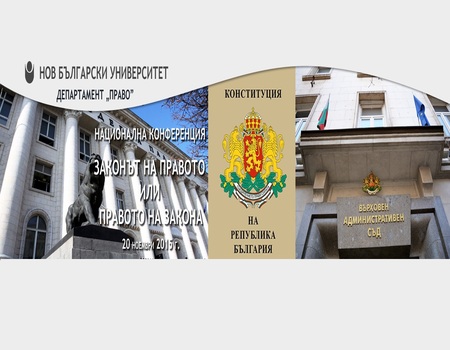
The alternative methods of conflicts resolution represent a form of personal, cultural and religious empowerment that denies the authority of the authoritarian power to resolve conflicts. These methods assume the will and activity of the society, as well as its maturity, so that the society be able to resolve its internal issues and conflicts on its own merits. Negotiations and reconciliation are historically known and practiced in different versions in the lands of Bulgaria. Hence, Bulgarian society has traditions in the resolution of its internal conflicts, commensurable to other societies in which such methods are deeply rooted.
More...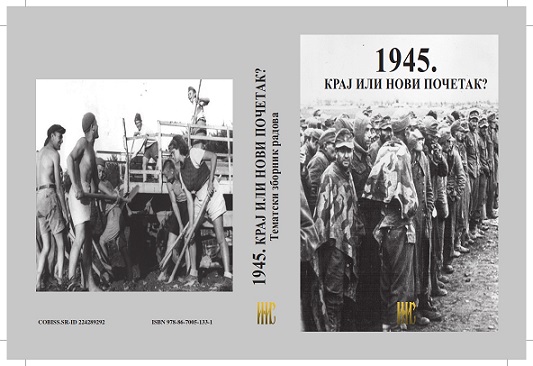
The final military operations at the end of the war in the Balkans were important in the context of transformation of WW II into a conflict of the former allies. As Germany’s power waned, the Western Balkans became one of the zones where spheres of interest were to be delimitated. Conflicting Soviet and US/UK interests in the Eastern Balkans, in the hinterland of the Straits, had a larger conflict potential in the context of sudden enlargement of the Soviet zone of interest. This conflict connected with the inner Balkans was especially acute on the Mediterranean coasts. The importance of the Straits for Russia was immense already in early 20th century. During WW II the situation with delimitation of imperial zones of influence in the Balkans partly resembled the one in WW I. The USSR had reserve plans for a counter-offensive in case of the Allied betrayal that were the fruit of the possibility of the first blow being stricken by British and American forces and their potential allies - the Germans, the Italians. On the local Balkan level such documents were no secret. Tense expectation of the Soviet forces on the borders of Greece and Turkey peaked twice in the HQ of the 37th Army Division in connection with global developments – the end of WW II in Europe (spring 1945) and the final end of WW II (late summer, fall 1945). In the first case the plans were exclusively defensive and in the second they comprised (counter) attack. No doubt, these plans were only elements of both the regional policy of the USSR (support for Greek partisans through Yugoslavia and Albania, reliance on Kurdish insurgents in Iran) and the global construction of opposition to the USA and UK - which goes beyond the scope of this article.
More...